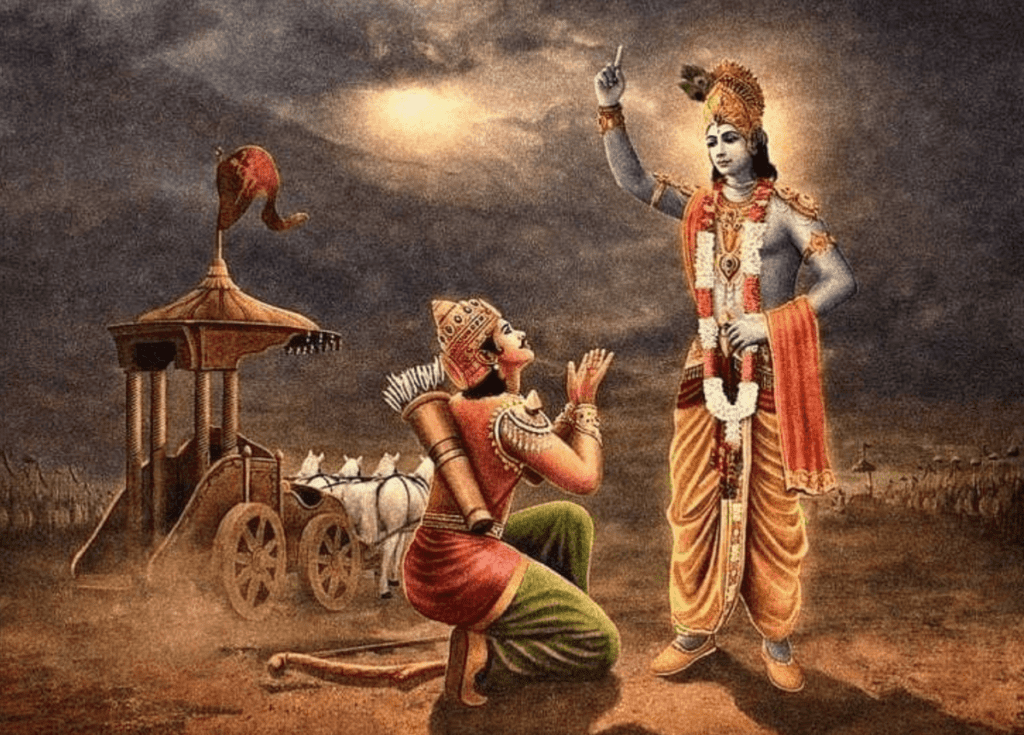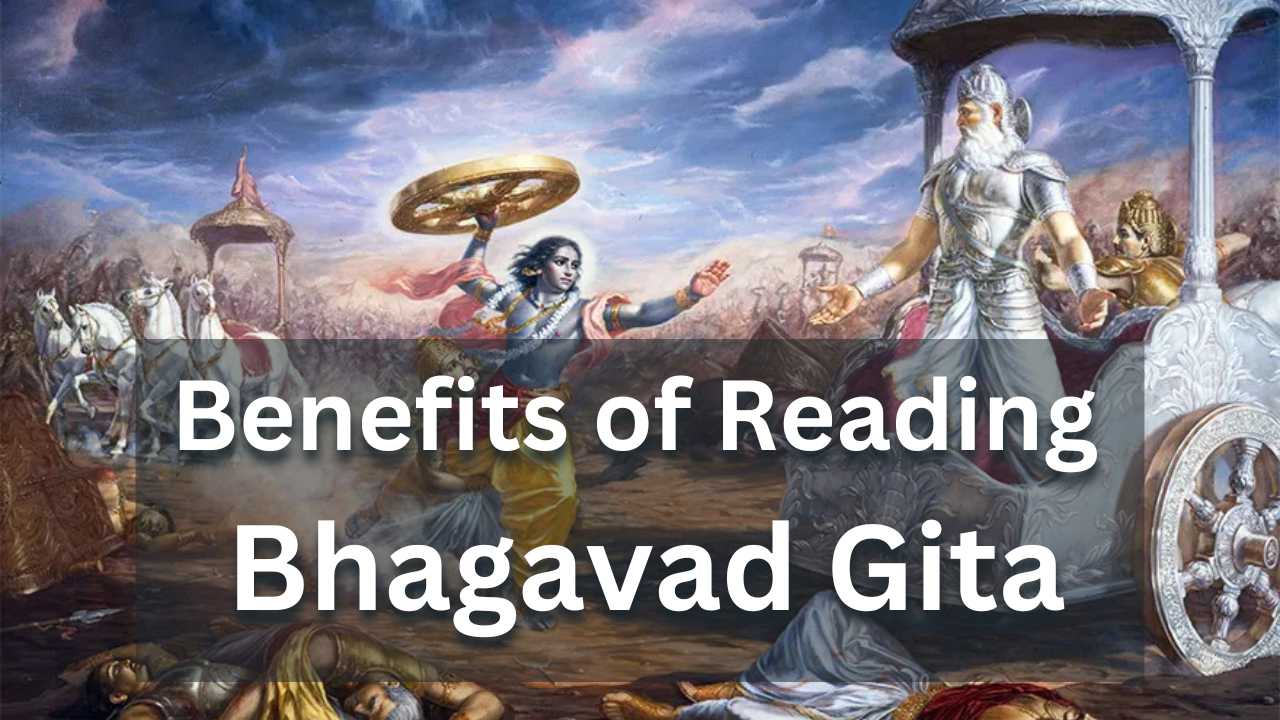I still remember the first time I opened the Bhagavad Gita. To be honest, I wasn’t expecting much. I thought it would be this heavy, religious text that didn’t really connect with my life. But what I found was something completely different. The Gita didn’t preach or try to convert me—it spoke to me like a wise friend, offering insights into life, stress, purpose, and inner peace. The benefits of reading the Bhagavad Gita go beyond spirituality; it’s a guide for anyone trying to navigate the ups and downs of life.
In this post, I want to share the real, practical benefits of reading the Bhagavad Gita that I’ve experienced. And no, you don’t have to be religious or even particularly spiritual to get something out of it. It’s about finding clarity, balance, and maybe even a little peace in our busy, chaotic lives.
Also read – Key Quotes from the Bhagavad Gita: Timeless Wisdom for Everyday Life
1. Finding Clarity in Confusing Times
One of the biggest benefits of reading the Bhagavad Gita is gaining clarity during confusing times. Life throws so many decisions our way—career moves, relationships, personal goals—and sometimes it’s hard to know what the “right” choice is. The Gita teaches us to look inward for answers.
There’s this powerful line: “Whenever dharma declines and the purpose of life is forgotten, I manifest myself.” (Chapter 4, Verse 7). It reminded me that when life feels overwhelming and directionless, it’s an invitation to reconnect with my purpose. The Gita helps strip away the noise, guiding you to listen to your inner voice.
2. Managing Stress and Anxiety
One of the most practical benefits of reading the Bhagavad Gita is learning how to manage stress and anxiety. We live in a world that’s constantly demanding our attention—work deadlines, social media pressures, personal expectations—it never ends. The Gita teaches us to let go of the things we can’t control.
Krishna tells Arjuna, “You have the right to work, but never to the fruit of your work.” (Chapter 2, Verse 47). This hit me hard. How many times have I stressed over outcomes—whether a project will succeed, if people will like what I do, or if things will go exactly as planned? The Gita teaches us to focus on the effort and release attachment to the results. It’s not about giving up; it’s about finding peace in knowing you did your best.
3. Building Resilience and Inner Strength
Another key benefit of reading the Bhagavad Gita is building resilience and inner strength. Life isn’t always smooth sailing. We all face setbacks, heartbreaks, and failures. What the Gita taught me is that these challenges are not roadblocks but opportunities to grow.
“The soul is neither born, nor does it ever die.” (Chapter 2, Verse 20). This line isn’t just about life after death—it’s about realizing that our true self is unbreakable. When we stop identifying so much with our failures and successes, we become more resilient. It’s like realizing that no matter how rough the storm gets, there’s a part of you that remains calm and steady.

4. Enhancing Focus and Productivity
One of the surprising benefits of reading the Bhagavad Gita is how it enhances focus and productivity. In today’s fast-paced world, staying focused is a challenge. The Gita introduces the concept of Karma Yoga (the yoga of action), which is all about being fully present in whatever you do.
Krishna says, “Perform every action with your heart fixed on the Supreme Lord. Renounce attachment to the fruits. Be even-tempered in success and failure.” (Chapter 2, Verse 48). This isn’t about being religious; it’s about giving your full attention to the task at hand. Whether you’re writing an email, cooking dinner, or working on a big project, doing it with full focus not only improves the quality of your work but also makes the process more enjoyable.
5. Understanding and Managing Relationships
Improving relationships is another powerful benefit of reading the Bhagavad Gita. Relationships—whether with family, friends, or colleagues—can be complicated. The Gita offers wisdom on how to approach relationships with compassion and detachment. That might sound contradictory, but it’s not.
Krishna teaches about seeing the divine in everyone: “He who sees all beings in the Self and the Self in all beings, never turns away from It.” (Chapter 6, Verse 29). This doesn’t mean you let people walk all over you, but it helps you approach conflicts with more understanding and less ego. It’s about loving fully while recognizing that you can’t control others’ actions or feelings.
Also Read: Bhagavad Gita: A Guide to Inner Peace and Purpose
6. Finding Purpose and Meaning
One of the most transformative benefits of reading the Bhagavad Gita is finding purpose and meaning in life. A lot of us go through life feeling like we’re just checking boxes—go to school, get a job, buy a house…but what’s the point? The Gita dives deep into the idea of Dharma, or purpose.
“It is better to live your own destiny imperfectly than to live an imitation of somebody else’s life with perfection.” (Chapter 3, Verse 35). This line resonated with me so much. In a world where we’re constantly comparing ourselves to others, the Gita reminds us that true fulfillment comes from living our own truth, even if it’s messy and imperfect.
7. Achieving Inner Peace and Contentment
Ultimately, one of the greatest benefits of reading the Bhagavad Gita is achieving inner peace and contentment. The Gita doesn’t promise a life free of problems, but it offers tools to find peace despite the problems.
One of my favorite lines is, “When the mind is steady, and the heart is content, the soul is at peace.” (Chapter 6, Verse 27). It’s about learning to quiet the noise in our heads and appreciate the present moment. Meditation, mindfulness, and focusing on the present—these aren’t just modern self-help trends. They’re timeless principles that the Gita has been teaching for centuries.
Final Thoughts
The benefits of reading the Bhagavad Gita go beyond spiritual enlightenment. It’s about discovering tools that help you navigate life with more clarity, purpose, and peace. Whether you’re facing a tough decision, feeling overwhelmed, or just looking for deeper meaning, the Gita offers wisdom that feels surprisingly modern and relevant.
So if you’re curious, pick it up. You don’t have to read it all at once. Just a few verses can spark insights that stay with you long after you’ve closed the book.
Have you experienced the benefits of reading the Bhagavad Gita? What lessons have you taken from it? Think over these questions and reflect.

